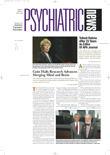Chris Koyanagi, policy director of the Bazelon Center for Mental Health Law, told attendees at APA's 2004 annual meeting in New York City last month that states have enacted a complicated array of policies to restrict access to prescription drugs for Medicaid beneficiaries.
Mental health advocates, however, can find some glimmer of hope in the results of a Bazelon Center survey of those policies conducted last summer and updated early this year.
Koyanagi pointed out that prescription drugs make a likely target for restrictions because their costs are increasing twice as fast as total Medicaid costs. In 1998 antipsychotics and antidepressants accounted for 19 percent of total costs of prescription drugs in the Medicaid program.
According to a study by the Lewin Group, funded by the National Institute of Mental Health and issued in January 2000, the use of atypical antipsychotics in Medicaid has grown dramatically (Psychiatric News, June 21, 2002).
Spending on those drugs jumped 160 percent between 1995 and 1998. The introduction of atypical antipsychotics did not merely replace older therapies, but instead expanded the market for use of those agents, according to the report.
The Bazelon Center identified the prevalence in states of five restrictive policies:
•
Prior authorization: A particular drug must receive authorization before it can be prescribed (49 states).
•
Preferred drug list (PDL): Drugs are placed on a PDL and become exempt from prior authorization (26 states; 12 additional states have authorized).
•
Prescription limits: The number of prescriptions that can be filled is limited in a given time period. Legally, there must be a means of appeal, but often the patient or physician does not pursue an appeal (16 states).
•
Use of generics: A generic must be prescribed before a brand-name drug (44 states).
•
“Fail-first” policies: A patient must fail on a specified drug before a more expensive drug can be prescribed (18 states).
These policies are being applied in various combinations to antipsychotics (typical and atypical), antidepressants (SSRIs and others), anticonvulsants, antiparkinsonian medications, stimulants, and sedatives/hypnotics/anxiolytics.
The good news with regard to these developments, according to Koyanagi, is the extent to which states are exempting drugs used to treat mentally ill people from those policies.
Thirty-one of the 49 states requiring prior authorization have “some exclusions” for such drugs. Of the 31, most do not require prior authorization for antipsychotics and anticonvulsants. States more frequently require prior authorization for antidepressants, stimulants, and sedatives/hypnotics/anxiolytics.
The use of a PDL is the most rapidly growing restrictive practice, said Koyanagi. Of the 26 states with operational PDLs, 15 have some form of exclusion for one or more of the drugs used to treat mental illness. Thirteen states with PDLs do not subject antipsychotic medications to PDL restrictions.
Of the 16 states that limit the number of prescriptions, five exempt one or more drugs or group of drugs used to treat mental illness.
Fail-first policies frequently do apply to antipsychotic medications. Of the 18 states with fail-first policies, nine require failure on a specified antipsychotic medication before another medication can be prescribed. Seven require failure on a generic drug before a specified brand-name drug can be prescribed.
Koyanagi told the audience that states will continue to try to control prescription-drug costs and that mental health advocates should work with Medicaid officials to identify cuts that avoid a “meat-axe” approach (see box on
page 5).
“Medicaid Policies on Outpatient Prescription Drugs: A Survey and Discussion of Advocacy” was a presentation at the session “Wither the States?,” sponsored by the American Association of Community Psychiatrists and the National Association of State Mental Health Program Directors and supported financially by the Substance Abuse and Mental Health Services Administration.
The Bazelon survey results are expected to be posted online soon at<www.bazelon.org>.▪
